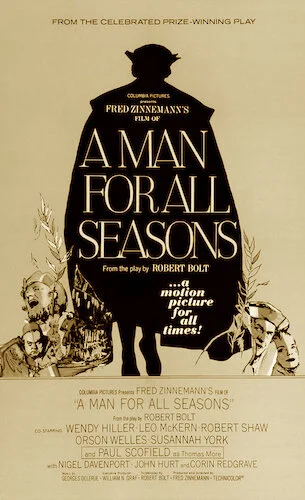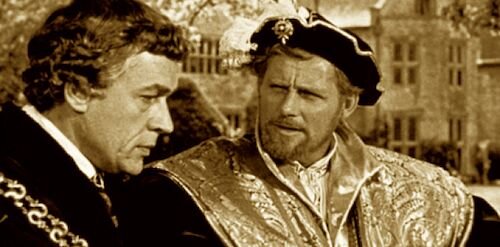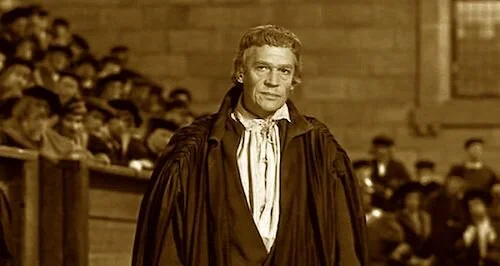A Man for All Seasons
This review is a part of the Best Picture Project: a review of every single Academy Award winner for the Best Picture category. A Man for All Seasons is the thirty ninth Best Picture winner at the 1966 Academy Awards.
Believe it or not, A Man for All Seasons was the final Best Picture winner awarded before the ushering in of the New Hollywood movement (through the Best Picture category, anyway). 1967 would have the most starkly different group of nominations for this category than ever before that point (more on that in the In The Heat of the Night review). Considering this, it's neat to look at A Man for All Seasons as a bookend of sorts: the last time the Academy felt confined to only rewarding obedient films.
Ironically, we have a feature that details the final days of Saint Thomas More: a modern figure in Christianity that rejected the acceptance of King Henry VIII of England's requests for divorce. The central figure puts his life and reputation on the line for his religious beliefs, thus making him pure in Catholicism, but problematic politically. Despite the viewpoint coming from More's stance, A Man for All Seasons feels relatively neutral in its stance on personal spirituality and politics. The characters trying to push against More are painted in a villainous light, but not all of England (in the same way that the film doesn't only work in favour of the religious characters).
A Man for All Seasons starts off as a debate, and slowly turns into the hunt for Sir Thomas More (who was eventually deemed a modern day saint by the Catholic church).
Fred Zinnemann's legal drama is more so about the build up to the trial than the trial itself, and that makes all of the difference in the world. If you were like me and didn't know the story of Sir Thomas More, then you wouldn't be sure just how badly his decision snowballs into a catastrophic hunt. If you do know how this one ends, Seasons still keeps you interested enough to stick around for the inevitable. Enough character based nuance is provided to make all sides of this conflict make sense: the people don't want to go against royalty, but More rejects having to besmirch his faith (a position he is a figurehead for).
This is absolutely Paul Scofield's show as More; his theatrical approach negates any scenery chomping, as he turns More into a Shakespearean fallen hero more than a stubborn guy refusing to make changes. This betters the film insurmountably. You don't have to be religious to make sense of why he is so driven by his core values. Unlike a film like Ben-Hur, personal beliefs don't sideline the film in any way, which is strange because Seasons is arguably more about religion than Ben-Hur is. Either way, Scofield shines above the rest of his cast, which include some highly notable names (Robert Shaw, a small appearance by Orson Welles, and even the first showing of a young John Hurt).
More ends up having to represent himself against the world, with his life on the line.
Don't get A Man for all Seasons twisted. It is not a simple film. Zinnemann and company do their best to turn this snippet in English history into a full on moral debate. It ends bravely for a biopic of this nature (no saturation here); it almost feels like the absolute bitter end of Act I for the life of the Academy Awards. From here on out, arthouse films, gruesome flicks, and non traditional deviations were all eligible for Best Picture. A Man for all Seasons feels a little bit like a catalyst to get there. It played by Hollywood's rules, but not enough to be suffocated. In the discussion of great legal dramas or religious works, A Man for all Seasons isn't brought up enough.
Andreas Babiolakis has a Masters degree in Film and Photography Preservation and Collections management from Ryerson University, as well as a Bachelors degree in Cinema Studies from York University. His favourite times of year are the Criterion Collection flash sales and the annual Toronto International Film Festival.






